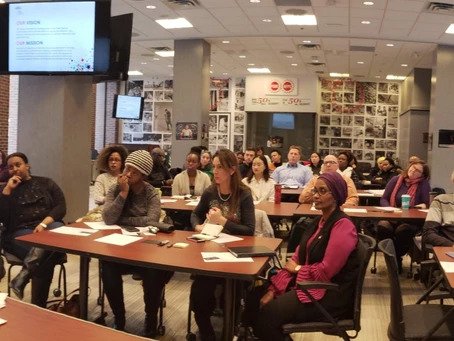A message from a white mom to other white parents,
Racism is nothing new, but the past week has seen protests in the United States, Canada and elsewhere against anti-Black racism and police brutality on a scale that we probably haven’t seen since the civil rights movement of the 1950s and 1960s. At the same time, racism is increasingly seen across the world through viral videos.
None of this is new for Black communities, but it may be new be for you. Many people who don’t normally pay attention to issues of inequity and injustice are for the first time, and they are wondering what to do. You may also think that we don’t have the same issues in Quebec/Canada, but we do. It is time for us to do the work of unlearning what we have been taught about race in our country and to offer new teachings to our children.
I am a white mother of two biracial kids in primary school. I have had several white and other non-Black friends reach out asking for resources and about what they can do to teach their kids about anti-Black racism. I have tried to refer to resources developed by Black people wherever possible and commit to continuing to look for such resources to learn myself and to share. This list of actions and resources is not comprehensive, but it is a start and, if all white parents followed these tips, it would make a meaningful difference in the lives of children and in their interactions between each other. I welcome feedback and suggestions.
My focus here is on anti-Black racism but many of these suggestions apply regarding what you can do to ensure that your parentings is supportive of LGBTQI2S+, Indigenous and other communities that face discrimination. Also, while I often refer to what white parents should be doing, many of these suggestions are applicable for non-Black racialized people too as they may experience racism differently than Black people in Canada. I’d suggest committing an hour or two each week to focusing on one or more of these actions if you want to have a meaningful impact.
1. Teach yourself first
Question what you have been taught about Black communities at school, in TV shows and in the media and develop your knowledge of African and Canadian history and current Black experiences.
Some resources:
Black experiences:
- The Skin We’re In, Desmond Cole
- How communities can support the mental health of black youth, Damion Nurse
- Black Communities in Canada, National Film Board
- Chimamanda Ngozi Adichie’s books and her Ted Talk, The Danger of a Single Story
- The Bad-Ass Librarians of Timbuktu, Joshua Hammer
- Diversify your social media feeds by following, reading and supporting Black creators, activists and educators. To get started, look at the accounts we follow and amplify.
Canadian and African history:
- Who Said there are No Resources for Teaching Black History?, Parents for Diversity
- Black History in Canada Education Guide, Historica Canada
- Black History in Canada: A Select Timeline, Historica Canada
- Canada’s Slavery Secret : The Whitewashing of 200 years of enslavement, Kyle G. Brown
- The podcast The Secret Life of Canada episodes on the Province of Jamaica and on Birchtown
· Search for information about African leaders and empires (for example, Wangari Maathai, Leymah Gbowee, Thomas Sankara, Kwame Nkruma, Patrice Lumumba, and the Ghanian, Malian, Songhai and Zoulou empires.
Learn how racism works in our society. It isn’t only about openly racist violence or slurs. Look around you- are there Black teachers at your kid’s school? Does your child have close relationships with Black people? Do you? Many of us operate based on racist stereotypes without even realising it. It’s hard not to when our education system often leaves out the contributions of Black people and media and movies tend to reinforce negative images.
Some resources:
- 10 Books About Race Non-Black People Should Be Reading Right Now by Kathryn Lindsay
- The urgency of intersectionality, TED Talk by Kimberlé Crenshaw
- White Fragility, Robin Diangelo
- Talking About Race: Bias, National Museum of African American History & Culture
- Free implicit bias test: Project Implicit (anglais)
- Follow the Center for Research-Action on Race Relations on social media
Learn to be ok being uncomfortable. If you are really doing the work of deepening your understanding of racism in Canada, you will feel uncomfortable. You may feel guilt, anger, sadness and shame. You may be criticized by Black people even when you are trying really hard and you may feel it’s unfair. Sit with those feelings and reflect deeply on the reasons for them. Talk about them with friends who are also on the same journey to educate themselves. Don’t let the discomfort paralyse you. It is part of the journey and means you are doing real work in evolving your thinking and transforming your parenting.
Don’t expect Black people to teach you. There are many online resource and books. You could start a study group or book club as well to learn with others.
2. Be a model for your kids
No matter how much you tell your kids not to be or act in racist ways, they need to see you in action. Speak up when relatives say something racist. Ensure that your workplace is hiring Black employees. Stay nearby to be a witness if a Black person is being arrested. Buy from local Black-owned businesses. Volunteer and donate to organizations supporting Black communities.
Some resources:
- 75 things white people can do for racial justice, Corinne Shutack
- Performative allyship is deadly (Here’s what to do instead), Holiday Phillips
- Welcome to Black Canada: How to Take Action, Quakelab
- Organizations you can support with a donation:
- Conseil de la communauté noir de Gatineau
- o CRAAR
- Support Black Initiatives or Organizations Helping Black Communities in Montreal
- Black Led Organizations in Quebec We Can Support Right Now
- Black Organizations And Anti-Racist Groups Canadians Can Support Now
Make sure your efforts support the work of Black communities and what they have requested of white allies.
3. Expose your children to the multiplicity of Black identities through events, books, shows, artists, social media and your social circle
Children are aware of racial differences and learn the subtle societal messages about race far earlier than we expect. While you can’t talk to an infant or toddler about race, you can be intentional about your choice of books, shows, etc.
Resource:
Read books not only about but also by Black people and find ones that address the Quebec/Canadian context. Make sure they are not only about hardship, struggle and perseverance. A book about a Black kid with the usual friendship drama is great too, for example.
Some resources:
- 3 Reasons Why #OwnVoices Books Matter
- Diversity Library, Parents for Diversity
- Shauntay Grant’s books
- Jacqueline Woodson’s books
- Viola Desmond Won’t be Budged by Jody Nyasha Warner et Richard Rudnicki
- The Brown Book Shelf
- Looking for Excellent “Diverse” Books for Children? Start here!, Embrace Race
Also try to put your kids in situations whenever possible with Black authority figures, to provide models for them that counter stereotypes about Black people.
4. Talk about race with your kids
The first time another kid made a racial remark to my kid, she was in kindergarten. The other kid, who was white, was about 5 years old. You can start having conversations about race by that age and going deeper into the topic as they get older and are able to understand more complex information.
Some resources:
- “Mom, Why Don’t You Have Any Black Friends?” Before you talk to your kids about race, answer this question, Michelle Silverthorn
- Anti-Racism For Kids 101: Starting To Talk About Race, Books for Littles
- Your Kids Aren’t Too Young to Talk About Race: Resource Roundup, Katrina Michie
- How to talk to kids about race, and why you should start now, Zulekha Nathoo
- Talking With Children About Racism, Police Brutality and Protests, Aha Parenting
- Teaching 6-Year-Olds About Privilege and Power, Katrina Schwartz
When discussing racism, be careful not to have the conversation lead your child to feelings of guilt and powerlessness. Ensure that, while you talk about the problems, you also talk about the many initiatives and movements for equality across the world led by Black people. Also be sure to talk about white people who have played supporting roles too, to give them models for their own future.
Teach your child how to be actively anti-racist by interrupting racism. Role play at home situations they may encounter at school or elsewhere and how they can speak up. For older children, if they hear a racist joke for example, it can be quite effective to ask why it is funny. This often makes the teller of the joke aware of how problematic it is. Talk about social media, the impact of graphic videos of violence against Black people and racist online comments and how to react.
You won’t always get it right, especially when something happens unexpectedly. Follow up with your child after taking time to think or do research if you don’t.
5. Push for change at your child’s daycare or school
Advocate with Black parents for curriculum changes to reflect Black experiences and contributions and for the purchase of books with Black characters and by Black authors (again, not just ones about hardship).
Some resources:
- What is Equitable and Inclusive Learning? A Parent’s Perspective on the First Day of School, Parents for Diversity
- Turner Consulting Group (teachers can be encouraged to use the free Inclusive Classrooms Self-Assessment)
Advocate for Black personnel to be hired, retained and promoted. Having just one black teacher has significant impacts on Black academic success. It is also essential for white students to have Black teachers. For many white students, this may be one of the rare authority figures in their lives who is Black and can have a formative impact on their perceptions of Black people.
Article:
Request race-based data collection from your school board regarding suspensions and other forms of discipline, as well as streaming into non-academic programs. Many studies have shown that Black students are disproportionately disciplined and encouraged not to take more academic options. If data in your school board reflects such trends, demand action to address disparities.
Article:
The road will not always be easy. Many people around you won’t understand and you will have to have difficult conversations with loved ones, community members, and school personnel. Your child may not understand the importance of what you are doing. Find others to accompany you on this journey so that you have support. Don’t give up and take the easy route. We are raising the next generation and if we do not raise white children differently, we will repeat the cycle and perpetuate racism even if we don’t intend to.
No one wants to be the parent whose child asks them as an adult, “Why didn’t you tell me this was happening in my country? Why didn’t you give me the tools to do better?” Let’s do better.





I see what you’re expression during this post, but if we tend to all did this, then it wouldn’t be as cool as we thought, or would it. ok it would.
I’m amazed, I must say. Rarely do I come across a blog that’s both educative and amusing, and without a doubt, you have hit the nail
on the head. The issue is something too few folks are speaking intelligently about.
I’m very happy I found this during my hunt for something concerning
this.
There is definately a lot to find out about this subject. I like all the points you made
I really like reading through a post that can make men and women think. Also, thank you for allowing me to comment!
This is really interesting, You’re a very skilled blogger. I’ve joined your feed and look forward to seeking more of your magnificent post. Also, I’ve shared your site in my social networks!
I always learn so much from your posts. You have a gift for explaining complex ideas in a way that is easy to understand and remember.
Your writing is engaging and informative. I always look forward to reading your posts.
Thank you for sharing your wisdom with us. Your insights are always valuable and appreciated.
Your post has given me a new perspective on a topic I thought I knew everything about. Thank you for expanding my knowledge.
Great information shared.. really enjoyed reading this post thank you author for sharing this post .. appreciated
I always look forward to reading your posts. Your writing is insightful, informative, and engaging.
I really enjoyed reading this post. Your writing is clear and engaging, and you always manage to make complex ideas accessible and easy to understand.
I just like the helpful information you provide in your articles
This post is truly inspiring. I feel motivated to take action towards my goals after reading it.
Good post! We will be linking to this particularly great post on our site. Keep up the great writing
This is my first time pay a quick visit at here and i am really happy to read everthing at one place
Great information shared.. really enjoyed reading this post thank you author for sharing this post .. appreciated
Usually, I don’t read, but your content makes me read more.
I truly appreciate your technique of writing a blog. I added it to my bookmark site list and will
I just wanted to take a moment to thank you for the amazing article you wrote. I was thoroughly impressed with the level of detail and research that went into it. The information was presented in a way that was easy to understand and follow. I especially appreciated the examples you provided, as they really helped to illustrate the points you were making. It was great to see such an in-depth look at the topic. Overall, it was an excellent article and I’m glad I had the chance to
You’re so awesome! I don’t believe I have read a single thing like that before. So great to find someone with some original thoughts on this topic. Really.. thank you for starting this up. This website is something that is needed on the internet, someone with a little originality!
I am truly thankful to the owner of this web site who has shared this fantastic piece of writing at at this place.
This website has become my intellectual playground, a place where I can explore a multitude of fascinating topics and indulge in the joy of learning. The administrator’s dedication to curating diverse and engaging content is truly admirable. Each article is a testament to their expertise and passion for the subject matter, offering readers a rich tapestry of knowledge and insights. I find myself constantly inspired and challenged by the depth of analysis and the thought-provoking perspectives presented on this platform. The administrator’s ability to communicate complex ideas in a clear and accessible manner is a true gift. I am immensely grateful for the opportunity to engage with such exceptional content and for the administrator’s unwavering commitment to providing a platform that nurtures intellectual curiosity and fosters a love for lifelong learning.
There is definately a lot to find out about this subject. I like all the points you made
Very well presented. Every quote was awesome and thanks for sharing the content. Keep sharing and keep motivating others.
There is definately a lot to find out about this subject. I like all the points you made
Your words have resonated with us and we can’t wait to read more of your amazing content. Thank you for sharing your expertise and passion with the world.
I just like the helpful information you provide in your articles
Your content always keeps me coming back for more!
I’m often to blogging and i really appreciate your content. The article has actually peaks my interest. I’m going to bookmark your web site and maintain checking for brand spanking new information.
Good post! We will be linking to this particularly great post on our site. Keep up the great writing